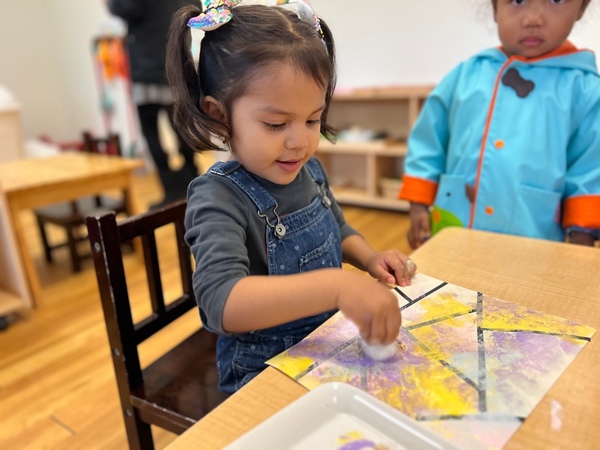(858) 759-0631
Toddlers have what Dr. Montessori called an Absorbent Mind. They learn by experiencing what we do: they mirror how we act (which is why using kind language matters!), imitate our every action, and absorb language like little sponges.
We make the most of this sensitive period for learning the language.
In class, we:
• Speak in complete sentences. To develop strong language skills, we don’t use baby talk (ex: “baba” for a bottle or “wah-wah” for water) or clipped short directive commands. Instead, we use whole, grammatically correct sentences with our toddlers and say, “It’s time to clean up for lunch. Please put your work away now and join me at the circle”—instead of chanting “clean-up, clean-up.”
• Give three-step language lessons. Our classroom has many materials aimed at vocabulary development, such as cards with pictures of furniture, animals, vegetables, etc. With each, our teachers give a three-step lesson. (1) They introduce the item: “This is a hat.” (2) They check for understanding: “Place the hat on your head.” (3) They ask the child to say the word: “What is this?”
• Read aloud purposefully from reality-based books. Toddler teachers are masters at reading aloud. We read books many times: first, for the story, getting into character. Then, to entice children to ask questions. Another time, to tie pictures to words. And, again, to explain vocabulary. Toddlers love repetition—a great way to build language skills.
• Begin to build phonemic awareness. During group time, his teacher may introduce sound games—helping children identify the beginning sounds of words. This is indirect preparation for the literacy program in the primary (ages 3-6) classroom— and a critical step towards becoming strong readers at the end of the kindergarten year.
You can help at home by creating fun, shared experiences:
• Explore the world and talk about it. Children learn new words best when they’re interested. One great way to develop vocabulary is to go out into the world together. Go to the park. Take a bus. Visit a beach or a forest. Become a museum member. Make grocery trips fun by sharing the names of the colorful fruits and vegetables on display, or ask your child to help you find an item on your list. Toddlers are in a what stage: they urgently want to learn the names of everything!
• Read aloud every day. Reading reality-based books together is one of the best ways to develop language skills. For your toddler, it’s not so much about literacy (don’t point to words!) but about being playful with language, listening to words used in a story, and learning the different inflections used to convey a particular emotion or moment of the story, etc.
• Don’t speak for your child. Let them talk for themselves. Encourage older siblings not to speak for a toddler, either. Instead, encourage talk: ask open-ended questions (“What do you see?”) rather than yes/no questions (“Do you see the firetruck?”).
• Speak a second language at home. If one parent speaks a language other than English, speak it consistently with your child. Early bilingualism is a beautiful gift!
-Cricket Teacher

